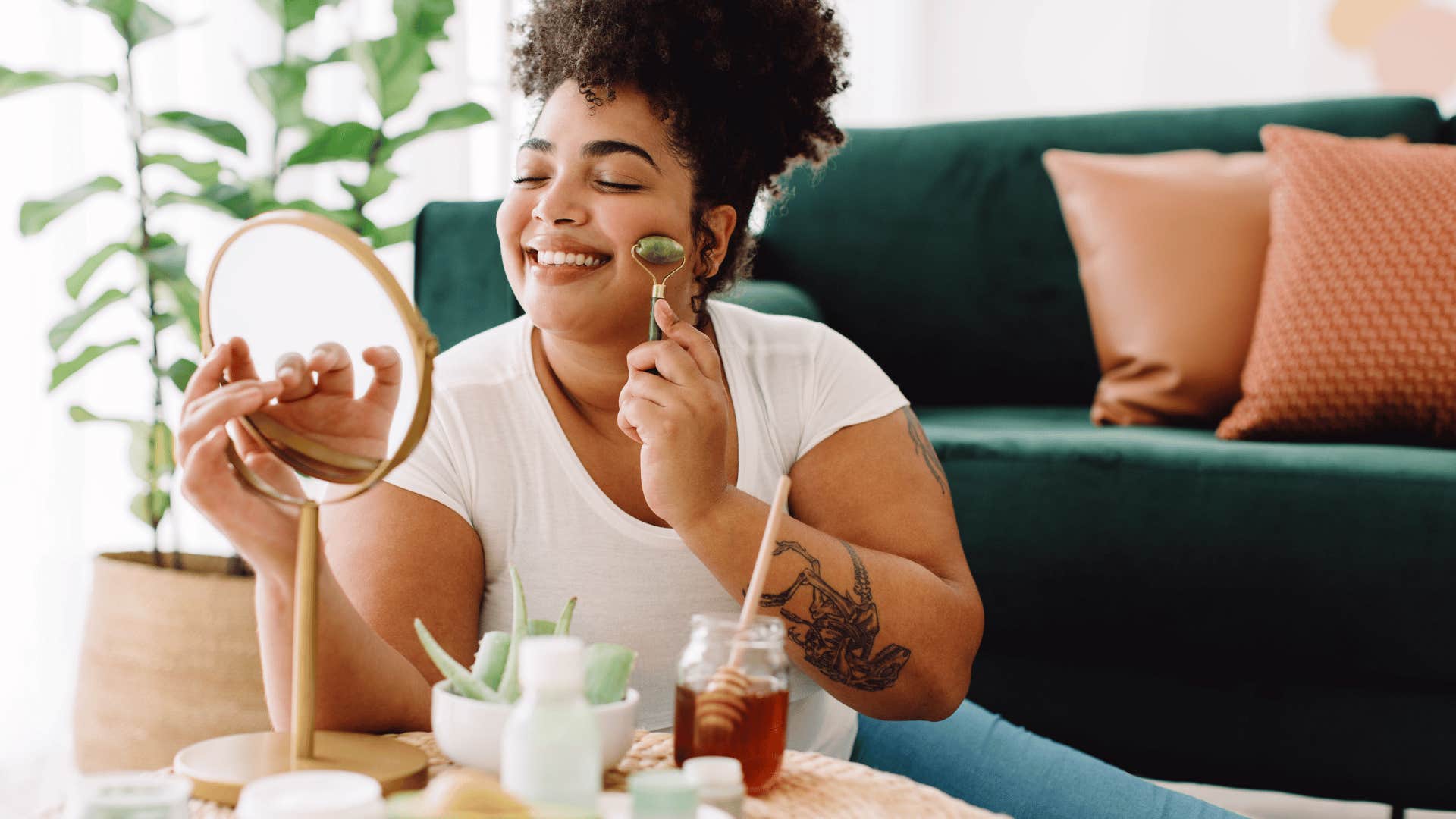11 Millennial Habits People Make Fun Of That Are Actually Good For You
Habits that prove living well never goes out of style.
 Dean Drobot | Shutterstock
Dean Drobot | Shutterstock Being a millennial gives plenty of fodder for jokes. Remember when we were convinced the world would collapse as 1999 turned into 2000? Now, over two decades later, we can reflect on Y2K as a symbol of simpler times. At that moment, however, millennials prepared for their LiveJournals to vanish and their artistic AIM away messages to fade into obscurity.
While it’s easy to joke about wearing skinny jeans and being emo, there are certain millennial habits people make fun of that are actually good for you. While their Boomer parents and every Gen Zer might think otherwise, most millennial habits reflect their intention to live mindfully, striving to be the healthiest, happiest versions of themselves that they can be.
Here are 11 millennial habits people make fun of that are actually good for you:
1. Their obsession with avocado toast.
 My Ocean Production | Shutterstock
My Ocean Production | Shutterstock
A millennial habit people make fun of that’s good for you is their obsession with avocado toast. Sure, paying $20 for a slice of multigrain bread topped with avocado, tomato, and an egg seems excessive, but you could also see spending that money as an investment in your health and well-being.
Haters might deride avocados as a high-fat food, yet a medium avocado has 22 grams of fat, and 15 of those are monounsaturated fats, which are “good” fats to include in your diet. Avocados are heart-health approved: The American Heart Association recommends eating monounsaturated or polyunsaturated fats, which help lower your LDL, the “bad” kind of cholesterol.
They’re also jam-packed with essential vitamins, like Vitamin C, which boosts your overall immune system, Vitamin E, and folate, but that’s not all. An entire avocado has less than 1.5 grams of sugar. They’re a high-fiber food that helps lower cholesterol and blood sugar while keeping you full.
Those perfect green fruits have more potassium than bananas, which their Boomer parents swear by to ward off leg cramps. Avocado toast is more than a millennial trend, as its apparent nutritional value will stand the test of time.
2. Their commitment to yoga.
 LightField Studios | Shutterstock
LightField Studios | Shutterstock
A millennial habit people make fun of that’s actually good for you is their commitment to yoga. Practicing yoga is about more than putting on a color-coordinated outfit from Lululemon and going into a downward-facing dog. Yoga is about moving your body, but it’s also a spiritual endeavor, a way to incorporate mindfulness into your life, on and off the mat.
On an episode of his podcast, neuroscientist Andrew Huberman discussed a study that “really emphasized the extent to which practitioners of yoga don’t just learn movements, they learn how to control their nervous system in ways that reshape their relationship to pain, to flexibility, and to the kinds of things that the neuromuscular system was designed to do.”
Yoga instructor and educator Nikita Desai spoke about how practicing yoga can be a form of cultural appropriation, noting that “People are practicing yoga for flexibility and aesthetics.”
“They do not necessarily identify as spiritual but are just doing it for exercise,” she explained. “Valuable ancient traditions and techniques are adapted for contemporary reasons, [and] Sanskrit, one the languages of yoga, is often disregarded, further white-washing the practice.”
While it might be easy to poke fun at millennials for spending money on boutique workouts, yoga included, they remain committed to taking care of themselves holistically.
3. Their skincare routines.
 JLco Julia Amaral | Shutterstock
JLco Julia Amaral | Shutterstock
The urge to hyper-focus on their skincare routine is a millennial habit people make fun of that’s actually good for you. People on the outside, looking in, might see the millennial skincare trend as a frivolous way to spend money or a sign that the darker machinations of the beauty industrial complex trap millennials.
Yet strictly adhering to a skincare routine that involves toner, moisturizer, SPF, and a myriad of serums is something to celebrate, not make fun of. Devoting time and energy to skincare helps keep you young and staves off premature aging. There are worse things than putting on a lavender-infused face mask, like those pore-cleansing strips millennials used at middle school sleepover parties.
The actual value of skincare goes beyond self-care and protecting against sun damage. It’s a way to implement routine into an otherwise hectic lifestyle; plus, it feels great to slather goop all over your face, and we could all use more things that make us feel good in a challenging world.
4. Journaling.
 Luke SW | Shutterstock
Luke SW | Shutterstock
A millennial habit people make fun of that’s good for you, emotionally and physically, is journaling. Some people might not see the value of writing their thoughts and feelings into a notebook with a cover declaring, “Chase your dreams.” Still, millennials know that journaling leads to a healthier, happier life.
Neuroscientist Dr. Tara Swart shared research-based reasons why journaling is good for your mind, body, and soul.
“Journaling is more than an expressive outlet,” she explained. “It’s a scientifically-backed tool for enhancing memory, reducing stress, boosting mood, and even strengthening your immune function.”
Writing in a journal helps with cognition and memory, and it also helps with emotional processing.
“When you write, you engage multiple parts of your brain,” Dr. Swart pointed out. “The left hemisphere, which controls logical thinking, is occupied with writing itself, while the right hemisphere, associated with creativity and intuition, is given the freedom to explore and express emotions.”
She cited a study from the Journal of the American Medical Association, which found that people who wrote about stressful experiences had fewer issues with their health and improved immune system function.
“This improvement is thought to occur due to the release of emotional stress, leading to a decrease in physical stress responses, which in turn results in a stronger immune system,” Dr. Swart concluded.
5. Their need for ‘me-time’.
 Ground Picture | Shutterstock
Ground Picture | Shutterstock
People make fun of the millennial need for “me-time,” but this habit is actually good for you. We all need time to disconnect from the world around us and reconnect to ourselves, which is why carving out time just for yourself is such a valuable habit.
When it comes to self-care, millennials are consummate professionals. Self-care is more than taking bubble baths and listening to whale sounds; it’s about nourishment on all levels. It’s so that you can show up and be more present for yourself and the people around you.
Life and career transition coach Deborah Roth revealed why practicing radical self-care is so important.
“If we don’t place ourselves at the center of our lives, we become increasingly scattered, ungrounded, and miserable. If we don't create space for self-care, we won't be whole enough to care for all those we love or who depend on us,” she explained. “If our inner core, our ‘Circle of One,’ is weak, we can’t support our families, communities, and ultimately our larger visions for the world in the most empowered way possible.”
Roth recognized that self-care may appear challenging to prioritize, but integrating small actions into your daily routine is effective.
“Break it into a four-sided model of mind, body, heart, and spirit,” she advised. “What can you do daily to support and nurture yourself in each area to stimulate your mind, nurture your body, honor your feelings and relationships, and reconnect with your spirit?”
6. Being open about mental health.
 Prostock-studio | Shutterstock
Prostock-studio | Shutterstock
Being open about mental health is a millennial habit people make fun of that’s actually good for you. While a particular subsection of Boomer parents dismiss mental health struggles as evidence that younger generations should toughen up, the reality is that everyone struggles at some point in their lives, no matter what generational label they fall under.
Connection and support are essential for survival and well-being, so millennials openly share their experiences. Engaging in transparent conversations is crucial to reducing stigma and easing access to mental health services. Although this trend among millennials may be misinterpreted or mocked, it benefits people of all ages.
7. Spending money on experiences.
 MandriaPix | Shutterstock
MandriaPix | Shutterstock
Spending money on experiences instead of material items is a millennial habit people make fun of, and that’s good for you. Most people don’t need another bespoke, hand-poured candle that costs over $50 dollars or an outfit they’ll wear once and then shove in the back of their closet. Millennials are masters of buying experiences, which have more benefits than people like to give them credit for.
Millennials would rather spend money on concerts, plane tickets, or the tasting menu at the new Michelin-rated restaurant than anything else. Their habit of buying experiences represents a wonderful approach to life.
Instead of owning more things, they want to make memories with people they love. They want to feel life. They want to taste it. Buying experiences allows millennials to create meaning and strengthen their connections, which is what a fulfilling life is all about.
8. Living with roommates.
 bbernard | Shutterstock
bbernard | Shutterstock
Living with roommates is a millennial habit people make fun of, yet it's actually good for you. Whether you share living space with your bestie or a total stranger, having a roommate can save a significant amount of money, which is especially crucial right now, as the cost of living crisis doesn’t seem to be disappearing anytime soon.
While home ownership has become cost-prohibitive, the rental market isn’t much better.
In 2023, the U.S. Census Bureau reported that over 21 million renter households allocated more than 30% of their income to housing costs. This figure accounts for 49.7% of the total 42.5 million renter households in the rent burden calculation.
Did you know renters typically allocate around 31% of their income to housing expenses? In contrast, homeowners with a mortgage spend about 21.1%, while those without one spend just 11.5%. The Census Bureau highlighted that despite the higher median housing costs for renters, there are still 18.8 million homeowners who dedicate more than 30% of their income to their housing expenses. It's a financial balancing act for many!
Those percentages highlight the economic strain most people are experiencing. Living with roommates can help cut costs and boost a sense of community and connection, yet oftentimes, it’s not a choice but an essential way to make ends meet.
9. Owning too many tote bags.
 Cast Of Thousands | Shutterstock
Cast Of Thousands | Shutterstock
A millennial habit people make fun of that’s actually good for you is owning too many tote bags. Millennials might dive headfirst into the NPR fundraiser, giving away canvas totes in exchange for a donation, but their endless collection of tote bags is a good thing. It shows a steadfast commitment to sustainable living and environmental stewardship.
Every tote bag that a millennial buys reduces single-use plastic waste. What’s more, they can fit a month’s worth of avocados and oat milk into just one tote, which makes it all worthwhile.
10. Treating their pets like family members.
 LightField Studios | Shutterstock
LightField Studios | Shutterstock
A millennial habit people make fun of that’s actually good for you is the way they treat their pets like part of their family. People might wonder if a dog really needs to kibble topped with farm-fresh scrambled eggs every night, and the correct millennial answer is “Yes, absolutely.”
Doting on pets as though they’re tiny, furry people who lack the gift of speech might seem excessive, but it’s a good thing. The level of care and commitment millennials put into pet care shows how responsible and responsive they are.
Being a devoted pet parent might mean buying a subscription to the bone-of-the-month club or spending more money on their haircare routine than you do on your own, but millennials know that caring for their pets is a worthwhile investment. They give love to get love and reap the sweet, snuggly rewards.
11. Special little treats.
 PeopleImages.com - Yuri A. | Shutterstock
PeopleImages.com - Yuri A. | Shutterstock
A classic millennial habit people make fun of that’s good for you is buying yourself special little treats just because. Do they need to spend money on cappuccinos and croissants every time they leave the house? Maybe not, but it brings joy to their otherwise mundane existence, and it’s so yummy.
Cultivating a little treat habit might get expensive, but let’s face it: Not spending money on treats isn’t going to give them enough savings for a down payment, so literally, YOLO. Special treats are a way to celebrate small wins, like getting out of bed, putting on grown-up clothes, and greeting the world, which isn’t easy, but having something sweet always helps.
Alexandra Blogier, MFA, is a staff writer who covers psychology, social issues, relationships, self-help topics, and human interest stories.

